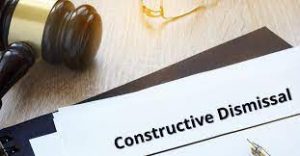Burden of Proof for Constructive Dismissal Claims
A constructive dismissal occurs when an employer imposes changes on employees that violate or amount to a repudiation of a fundamental term in their employment contract. A breach of this kind is often a serious problem that can cause an employee to feel compelled to resign. As such, it is important for any employer to exercise caution when making such changes and to consider the impact that they may have on their workforce.
In the majority of cases, for an employee to be entitled to a claim for constructive dismissal, they must have demonstrated that their working conditions were intolerable and therefore constituted a repudiation of a fundamental part of their contract of employment. This is a difficult test for any claimant to meet as it involves the need to prove that they had no choice but to resign as a result of the unreasonable working conditions. In other words, the employee must demonstrate that if not for their employer’s actions or omissions they would have remained employed at work.
To qualify as a breach of contract, the change must be unilateral and must be a significant one. A significant change is one that affects a fundamental aspect of the employee’s job, such as their pay, hours of work or duties. A change can be either an express term of the employment contract or a constructively implied term of the employment contract. The change must also have been severe and have a substantial adverse effect on the employee’s ability to work.

What is the Burden of Proof for Constructive Dismissal Claims?
Moreover, for a change to be considered a constructive dismissal lawyer, the employee must have raised their concerns about it promptly and have resigned within a reasonable timeframe following the implementation of the change. Failure to raise their concerns, or doing so in a slow and steady manner could mean that they have implicitly acquiesced or condoned the change.
If an employee can prove that they were constructively dismissed, they will be entitled to any severance or termination pay they are owed under their contract. In addition, they are likely to be able to take legal action against their former employer for breach of contract in an effort to have the damages awarded increased.
The burden of proof in a constructive dismissal claim is on the employee to establish, on a balance of probabilities, that they were forced to resign due to an unbearable work environment. The employee must then demonstrate that the employer’s breach of contract made continued employment intolerable and therefore they had no choice but to resign.
Employees who are unsure of their rights or who have been constructively dismissed should contact Bune Law for an informal consultation with a Toronto constructive dismissal lawyer. Our team will review your case and help you determine the strength of your argument for taking legal action against your employer. Contact us today to get started. We offer free consultations to clients!